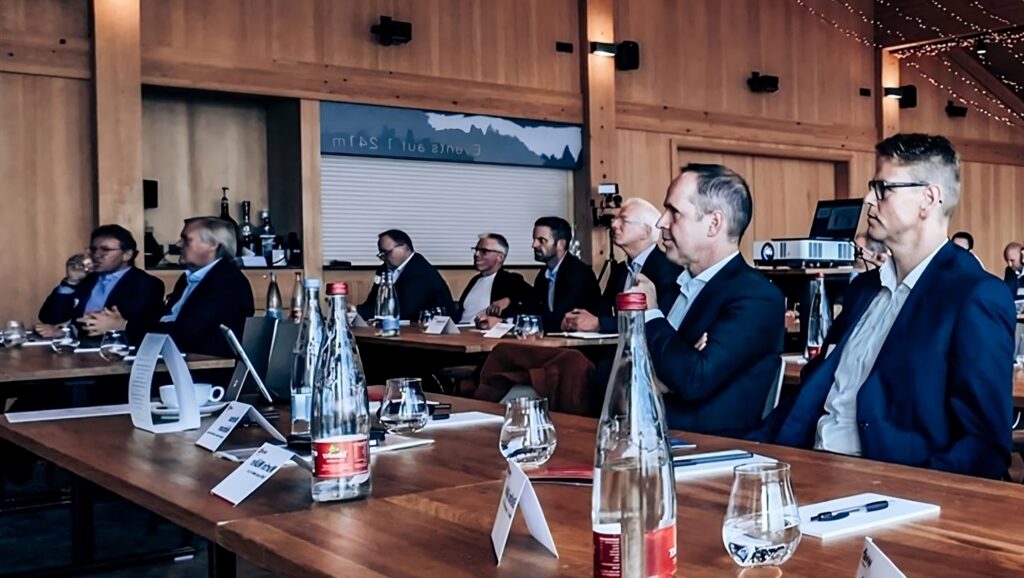- Home
- News & Insights
- Financing summit – creative solutions for challenging times
Financing summit – creative solutions for challenging times
Recap | Information event: Financing summit | 11 October 2024 | Bergwelt Kandel
Creative solutions for challenging times
The economy is faltering, and order intake has become volatile or even shrinking. Companies planning a refinancing, a generational change or having to fund investment programs are facing difficult market conditions. The buzzword ‘transformation’ is being used inflationary, and some even speak of de-industrialization in Germany. What role do banks and financial partners play in this situation? Does debt capital still make sense, or do mezzanine financings and minority equity offer a real alternative?
These and other questions were the focus of the wvib Financing Summit on the Kandel, where expert insights were provided by Michael Fabich, Chairman Capitalmind Investec, and Thorsten Gladiator, Managing Partner Capitalmind Investec. They discussed the crucial role and significance of the sector in today’s financial landscape.
The wvib (Wirtschaftsverband Industrieller Unternehmen Baden e. V. in the Southwest of Germany) is a trade association for industrial SMEs, a mouthpiece and service provider for family-owned medium-sized companies. Founded in 1946 by entrepreneurs for entrepreneurs, wvib comprises 1,040 manufacturing companies with 384,000 employees and a worldwide turnover of 75 billion euros. The association has over 60 full-time employees. At the invitation of wvib, Capitalmind Investec took part in the wvib Financing Summit with a presentation together with representatives of financing providers and companies.

Private equity as a flexible financing instrument: from locust to grasshopper
Private equity (PE) has undergone a remarkable transformation in recent decades. Once decried as ‘locusts’, private equity has now developed into an instrument to fund sustainable growth. PE also plays an important role in German medium-sized companies when it comes to successfully managing succession arrangements, changes in ownership or strengthening of equity. The success of the model is reflected in the figures: In Germany today, there are over 470 private equity firms that have invested in more than 5,500 portfolio companies, which together generate annual sales of €293 billion and employ around 1.5 million people. In the last five years alone, around €76 billion has been invested in the market. Thorsten Gladiator and Michael Fabich emphasize that PE today is more than just financial engineering. The focus is on long-term value enhancement through targeted operational improvements and strategic growth.
Between transformation and regulatory pressure
What will 2024 look like for a German automotive supplier? The Leiber Group, a family-run company with a long tradition, invested heavily in e-mobility – once a reason for customers and financing partners to be pleased. However, the expected unit numbers fell short of the forecasts by up to 80%. Managing Director Martin Müller describes the situation as a ‘vicious cycle’: price pressure from customers, constant transformation pressure and a growing flood of regulation are weighing on both the workforce and the company’s liquidity. Nevertheless, Leiber is looking optimistically to the future with a new brand identity and the motto ‘with ease ahead’. A consortium of five savings banks is securing the financing. ‘We don’t complain, we act’ – a motto that fits perfectly with the current times.
Financing the future – how, who and when?
A “management buyout” instead of a handover within the family raises exciting questions: How much capital can the management raise? How do you organise a gradual transition? The mechanical engineering firm MAFAC, managed by Rainer and Joachim Schwarz, tackled this process at an early stage. For the new managing director and shareholder Stefan Schal, financial security through a complex construct of silent partnerships, fixed-interest loans and a guarantee was anything but a given. The solution preserved the values of the family business and secured its future.
Global markets, local solutions
The Sparkasse Freiburg-Nördlicher Breisgau also sees the world as changing. While sales markets are global, financing is often secured locally. This is where Markus Hildmann comes in. With topics such as sustainability regulation, corporate finance and corporate succession, the Sparkasse supports companies with modern software solutions such as Nawisio, which are designed to facilitate compliance with CSRD, EU taxonomy and CSDDD. The centre of excellence for corporate succession is designed to ensure that the 125,000 companies affected each year find a suitable solution. Hildmann emphasises that it is crucial to involve financing partners at an early stage.
Mezzanine financing: stopgap or strategic advantage?
Mittelständische Beteiligungsgesellschaft (MBG) and Bürgschaftsbank BW work closely together. For Chris Hammer, the silent participation is a strategic tool for getting back on the offensive from a defensive position. Thanks to its subordination, lack of exit pressure and non-interference in day-to-day business, this instrument can create a solid basis for further outside capital without the need to sell company shares. Creditworthiness and room for maneuver are maintained – ideal for transformations, growth financing, innovations, successions or start-ups.
Conclusion
According to a study by the German Economic Institute (IW), Germany will need around €1.3 trillion of financing between now and 2030 to achieve the transformation and future growth it needs. This staggering figure makes it clear that traditional financing methods alone will not be enough. To successfully shape the economic future of German SMEs and finance transformations, it will take courage, collaboration and an open mind when it comes to tapping new sources of capital.
Watch the recap of the Summit here:

